Critical Review of Freire's Pedagogy - Western Sydney Uni
VerifiedAdded on 2023/03/30
|5
|1014
|423
Report
AI Summary
This assignment presents a critical review of Paulo Freire's 'Pedagogy of the Oppressed,' focusing on its main ideas such as fear of freedom, dehumanization, oppression, false generosity, and social class. It explores how these concepts can be applied by activists working towards social justice and social change, emphasizing the need to break the cycle of oppression, promote true generosity over false charity, and dismantle social class constructs. The review references examples like the struggles and initiatives of First Nations people and advocates for the liberation of both the oppressed and the oppressors, highlighting the importance of internal will and providing opportunities to overcome the fear of freedom. This paper was submitted by a student and is available on Desklib, a platform offering study tools and resources for students.
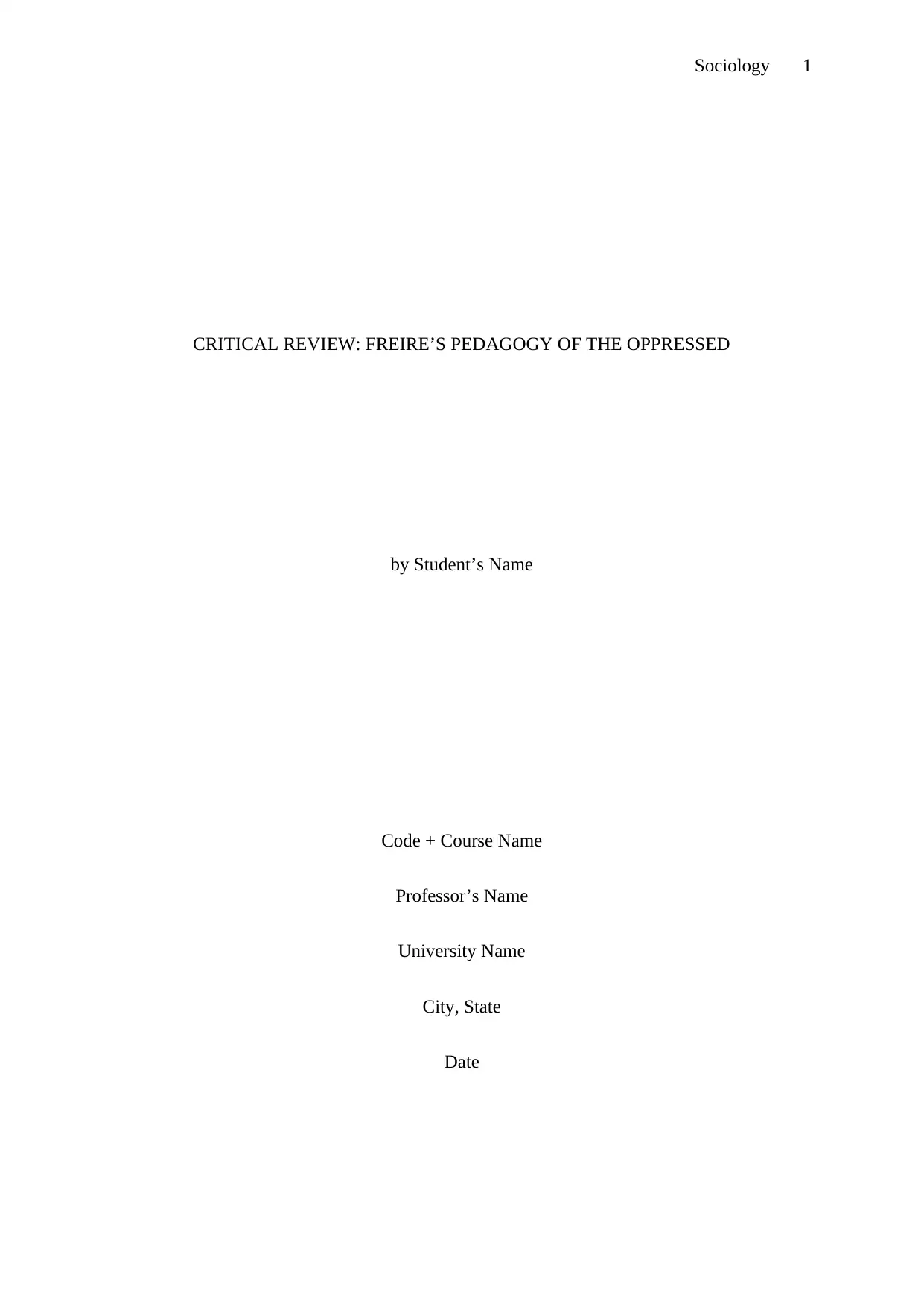
Sociology 1
CRITICAL REVIEW: FREIRE’S PEDAGOGY OF THE OPPRESSED
by Student’s Name
Code + Course Name
Professor’s Name
University Name
City, State
Date
CRITICAL REVIEW: FREIRE’S PEDAGOGY OF THE OPPRESSED
by Student’s Name
Code + Course Name
Professor’s Name
University Name
City, State
Date
Paraphrase This Document
Need a fresh take? Get an instant paraphrase of this document with our AI Paraphraser
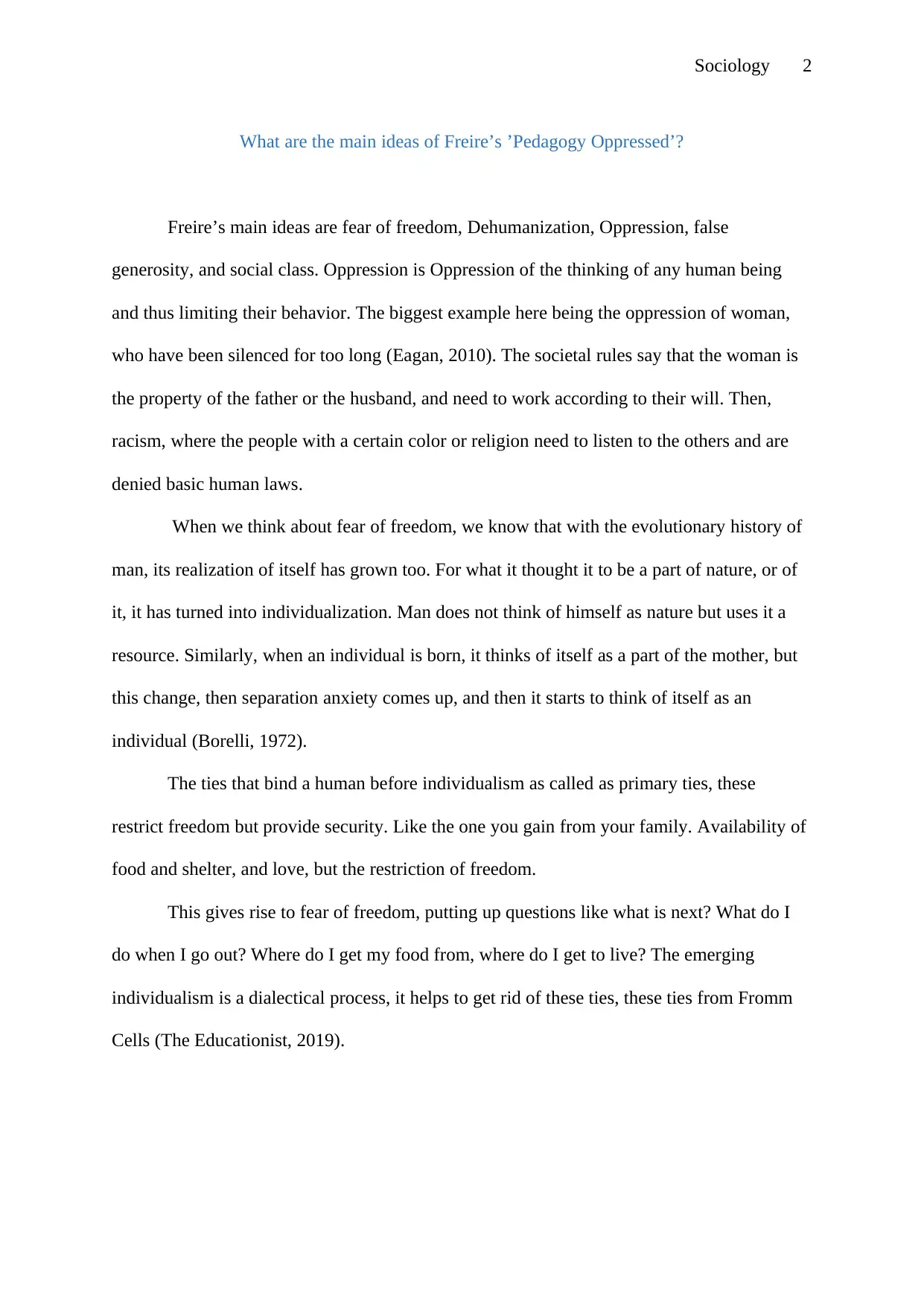
Sociology 2
What are the main ideas of Freire’s ’Pedagogy Oppressed’?
Freire’s main ideas are fear of freedom, Dehumanization, Oppression, false
generosity, and social class. Oppression is Oppression of the thinking of any human being
and thus limiting their behavior. The biggest example here being the oppression of woman,
who have been silenced for too long (Eagan, 2010). The societal rules say that the woman is
the property of the father or the husband, and need to work according to their will. Then,
racism, where the people with a certain color or religion need to listen to the others and are
denied basic human laws.
When we think about fear of freedom, we know that with the evolutionary history of
man, its realization of itself has grown too. For what it thought it to be a part of nature, or of
it, it has turned into individualization. Man does not think of himself as nature but uses it a
resource. Similarly, when an individual is born, it thinks of itself as a part of the mother, but
this change, then separation anxiety comes up, and then it starts to think of itself as an
individual (Borelli, 1972).
The ties that bind a human before individualism as called as primary ties, these
restrict freedom but provide security. Like the one you gain from your family. Availability of
food and shelter, and love, but the restriction of freedom.
This gives rise to fear of freedom, putting up questions like what is next? What do I
do when I go out? Where do I get my food from, where do I get to live? The emerging
individualism is a dialectical process, it helps to get rid of these ties, these ties from Fromm
Cells (The Educationist, 2019).
What are the main ideas of Freire’s ’Pedagogy Oppressed’?
Freire’s main ideas are fear of freedom, Dehumanization, Oppression, false
generosity, and social class. Oppression is Oppression of the thinking of any human being
and thus limiting their behavior. The biggest example here being the oppression of woman,
who have been silenced for too long (Eagan, 2010). The societal rules say that the woman is
the property of the father or the husband, and need to work according to their will. Then,
racism, where the people with a certain color or religion need to listen to the others and are
denied basic human laws.
When we think about fear of freedom, we know that with the evolutionary history of
man, its realization of itself has grown too. For what it thought it to be a part of nature, or of
it, it has turned into individualization. Man does not think of himself as nature but uses it a
resource. Similarly, when an individual is born, it thinks of itself as a part of the mother, but
this change, then separation anxiety comes up, and then it starts to think of itself as an
individual (Borelli, 1972).
The ties that bind a human before individualism as called as primary ties, these
restrict freedom but provide security. Like the one you gain from your family. Availability of
food and shelter, and love, but the restriction of freedom.
This gives rise to fear of freedom, putting up questions like what is next? What do I
do when I go out? Where do I get my food from, where do I get to live? The emerging
individualism is a dialectical process, it helps to get rid of these ties, these ties from Fromm
Cells (The Educationist, 2019).
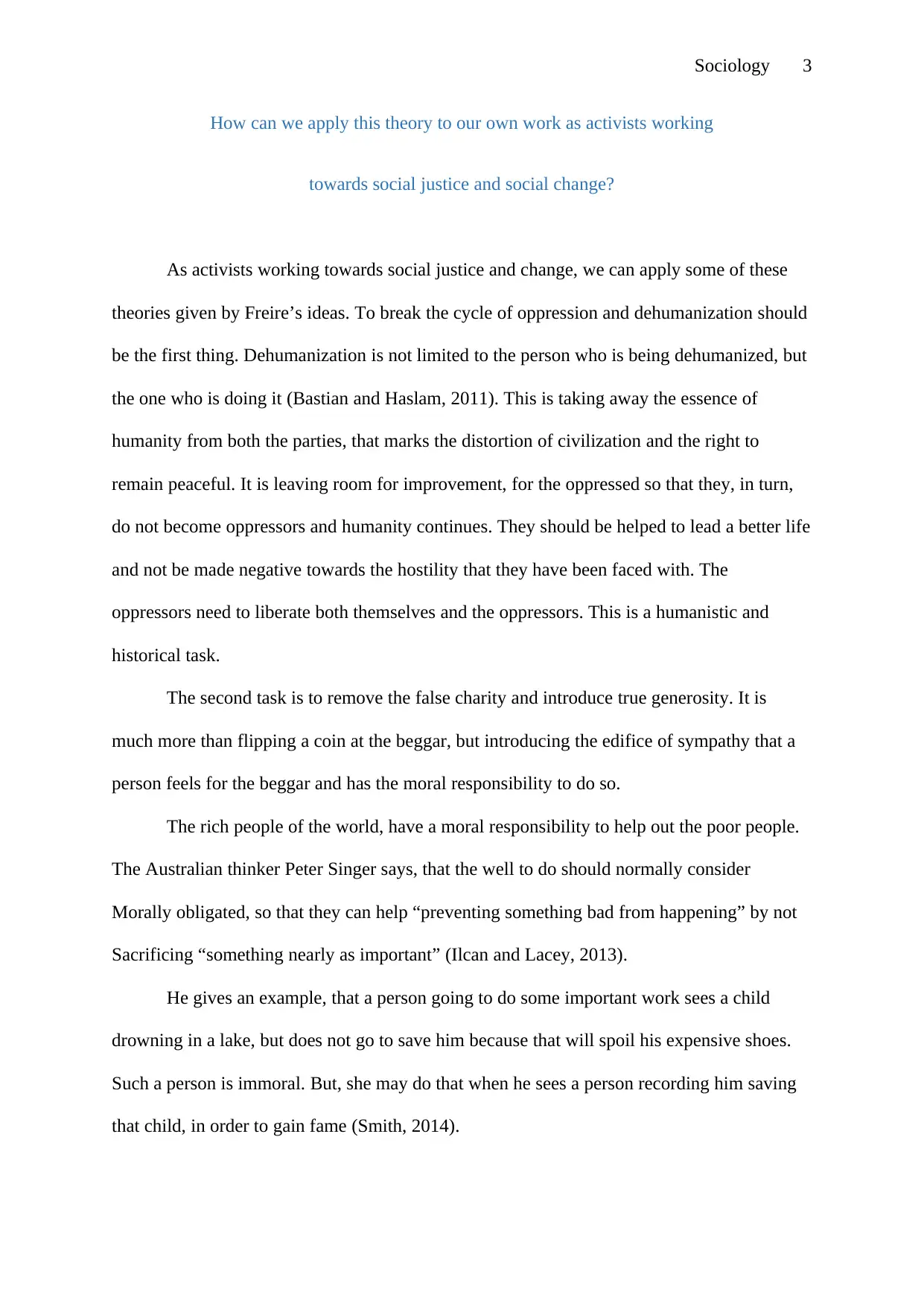
Sociology 3
How can we apply this theory to our own work as activists working
towards social justice and social change?
As activists working towards social justice and change, we can apply some of these
theories given by Freire’s ideas. To break the cycle of oppression and dehumanization should
be the first thing. Dehumanization is not limited to the person who is being dehumanized, but
the one who is doing it (Bastian and Haslam, 2011). This is taking away the essence of
humanity from both the parties, that marks the distortion of civilization and the right to
remain peaceful. It is leaving room for improvement, for the oppressed so that they, in turn,
do not become oppressors and humanity continues. They should be helped to lead a better life
and not be made negative towards the hostility that they have been faced with. The
oppressors need to liberate both themselves and the oppressors. This is a humanistic and
historical task.
The second task is to remove the false charity and introduce true generosity. It is
much more than flipping a coin at the beggar, but introducing the edifice of sympathy that a
person feels for the beggar and has the moral responsibility to do so.
The rich people of the world, have a moral responsibility to help out the poor people.
The Australian thinker Peter Singer says, that the well to do should normally consider
Morally obligated, so that they can help “preventing something bad from happening” by not
Sacrificing “something nearly as important” (Ilcan and Lacey, 2013).
He gives an example, that a person going to do some important work sees a child
drowning in a lake, but does not go to save him because that will spoil his expensive shoes.
Such a person is immoral. But, she may do that when he sees a person recording him saving
that child, in order to gain fame (Smith, 2014).
How can we apply this theory to our own work as activists working
towards social justice and social change?
As activists working towards social justice and change, we can apply some of these
theories given by Freire’s ideas. To break the cycle of oppression and dehumanization should
be the first thing. Dehumanization is not limited to the person who is being dehumanized, but
the one who is doing it (Bastian and Haslam, 2011). This is taking away the essence of
humanity from both the parties, that marks the distortion of civilization and the right to
remain peaceful. It is leaving room for improvement, for the oppressed so that they, in turn,
do not become oppressors and humanity continues. They should be helped to lead a better life
and not be made negative towards the hostility that they have been faced with. The
oppressors need to liberate both themselves and the oppressors. This is a humanistic and
historical task.
The second task is to remove the false charity and introduce true generosity. It is
much more than flipping a coin at the beggar, but introducing the edifice of sympathy that a
person feels for the beggar and has the moral responsibility to do so.
The rich people of the world, have a moral responsibility to help out the poor people.
The Australian thinker Peter Singer says, that the well to do should normally consider
Morally obligated, so that they can help “preventing something bad from happening” by not
Sacrificing “something nearly as important” (Ilcan and Lacey, 2013).
He gives an example, that a person going to do some important work sees a child
drowning in a lake, but does not go to save him because that will spoil his expensive shoes.
Such a person is immoral. But, she may do that when he sees a person recording him saving
that child, in order to gain fame (Smith, 2014).
⊘ This is a preview!⊘
Do you want full access?
Subscribe today to unlock all pages.

Trusted by 1+ million students worldwide
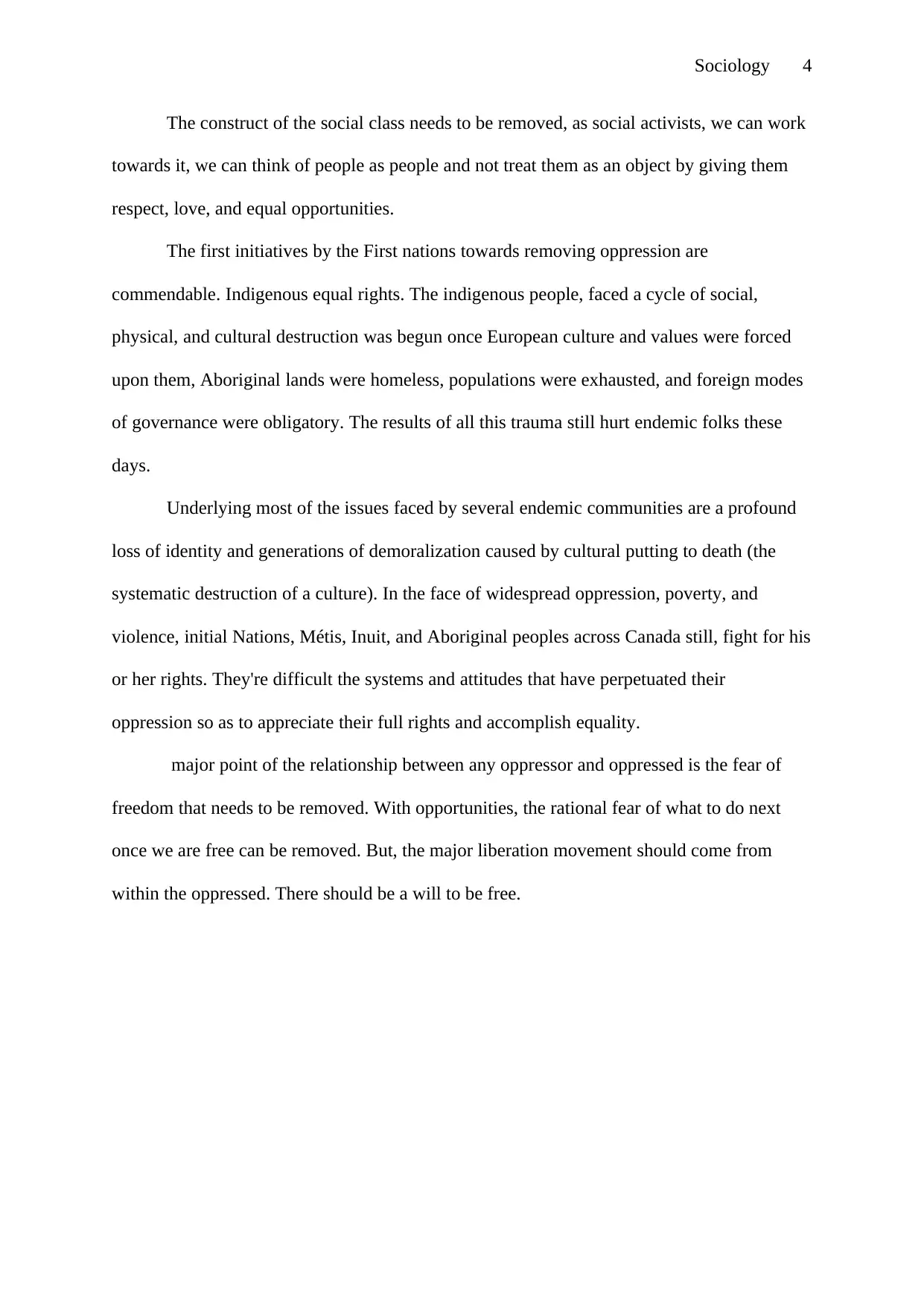
Sociology 4
The construct of the social class needs to be removed, as social activists, we can work
towards it, we can think of people as people and not treat them as an object by giving them
respect, love, and equal opportunities.
The first initiatives by the First nations towards removing oppression are
commendable. Indigenous equal rights. The indigenous people, faced a cycle of social,
physical, and cultural destruction was begun once European culture and values were forced
upon them, Aboriginal lands were homeless, populations were exhausted, and foreign modes
of governance were obligatory. The results of all this trauma still hurt endemic folks these
days.
Underlying most of the issues faced by several endemic communities are a profound
loss of identity and generations of demoralization caused by cultural putting to death (the
systematic destruction of a culture). In the face of widespread oppression, poverty, and
violence, initial Nations, Métis, Inuit, and Aboriginal peoples across Canada still, fight for his
or her rights. They're difficult the systems and attitudes that have perpetuated their
oppression so as to appreciate their full rights and accomplish equality.
major point of the relationship between any oppressor and oppressed is the fear of
freedom that needs to be removed. With opportunities, the rational fear of what to do next
once we are free can be removed. But, the major liberation movement should come from
within the oppressed. There should be a will to be free.
The construct of the social class needs to be removed, as social activists, we can work
towards it, we can think of people as people and not treat them as an object by giving them
respect, love, and equal opportunities.
The first initiatives by the First nations towards removing oppression are
commendable. Indigenous equal rights. The indigenous people, faced a cycle of social,
physical, and cultural destruction was begun once European culture and values were forced
upon them, Aboriginal lands were homeless, populations were exhausted, and foreign modes
of governance were obligatory. The results of all this trauma still hurt endemic folks these
days.
Underlying most of the issues faced by several endemic communities are a profound
loss of identity and generations of demoralization caused by cultural putting to death (the
systematic destruction of a culture). In the face of widespread oppression, poverty, and
violence, initial Nations, Métis, Inuit, and Aboriginal peoples across Canada still, fight for his
or her rights. They're difficult the systems and attitudes that have perpetuated their
oppression so as to appreciate their full rights and accomplish equality.
major point of the relationship between any oppressor and oppressed is the fear of
freedom that needs to be removed. With opportunities, the rational fear of what to do next
once we are free can be removed. But, the major liberation movement should come from
within the oppressed. There should be a will to be free.
Paraphrase This Document
Need a fresh take? Get an instant paraphrase of this document with our AI Paraphraser
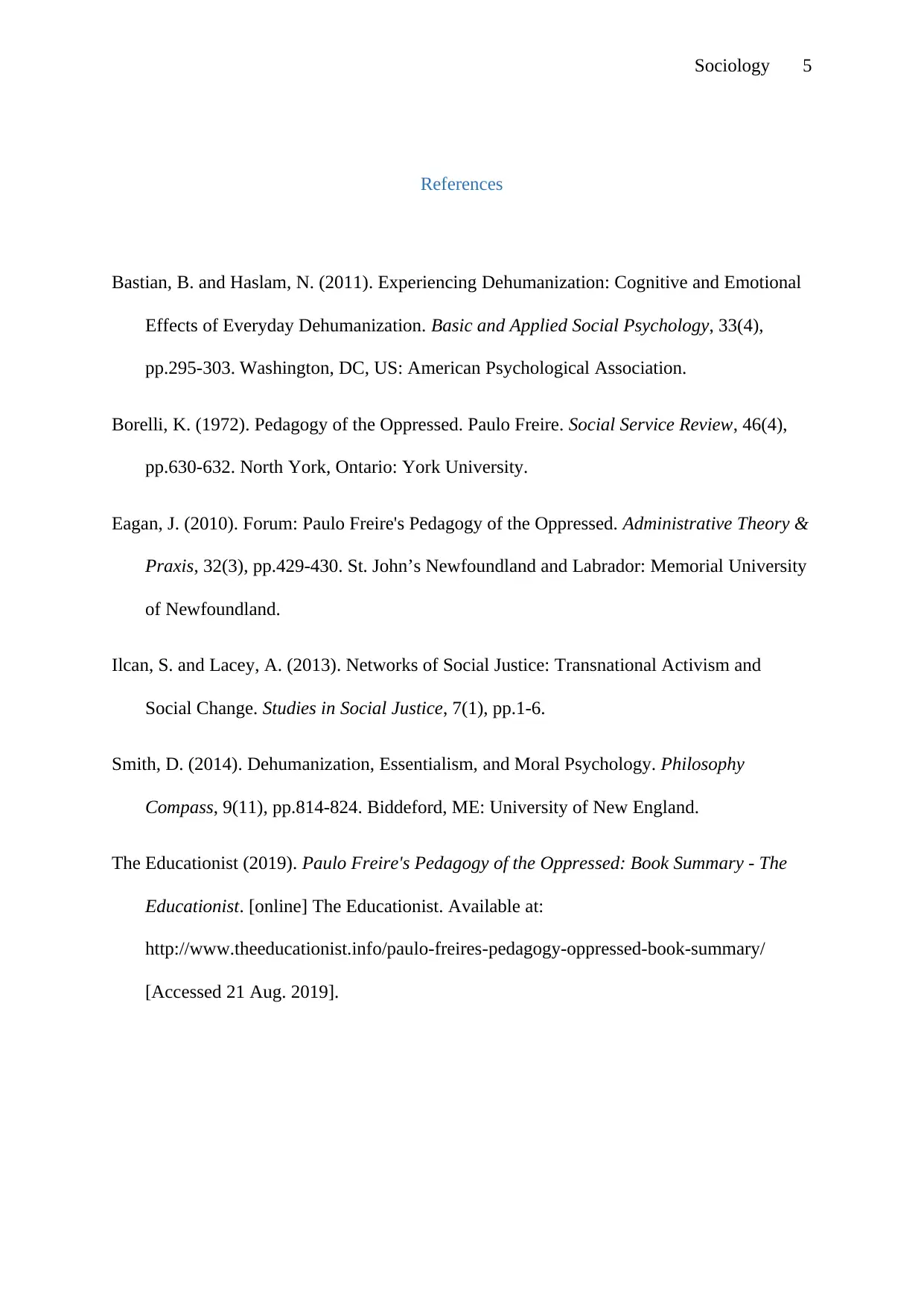
Sociology 5
References
Bastian, B. and Haslam, N. (2011). Experiencing Dehumanization: Cognitive and Emotional
Effects of Everyday Dehumanization. Basic and Applied Social Psychology, 33(4),
pp.295-303. Washington, DC, US: American Psychological Association.
Borelli, K. (1972). Pedagogy of the Oppressed. Paulo Freire. Social Service Review, 46(4),
pp.630-632. North York, Ontario: York University.
Eagan, J. (2010). Forum: Paulo Freire's Pedagogy of the Oppressed. Administrative Theory &
Praxis, 32(3), pp.429-430. St. John’s Newfoundland and Labrador: Memorial University
of Newfoundland.
Ilcan, S. and Lacey, A. (2013). Networks of Social Justice: Transnational Activism and
Social Change. Studies in Social Justice, 7(1), pp.1-6.
Smith, D. (2014). Dehumanization, Essentialism, and Moral Psychology. Philosophy
Compass, 9(11), pp.814-824. Biddeford, ME: University of New England.
The Educationist (2019). Paulo Freire's Pedagogy of the Oppressed: Book Summary - The
Educationist. [online] The Educationist. Available at:
http://www.theeducationist.info/paulo-freires-pedagogy-oppressed-book-summary/
[Accessed 21 Aug. 2019].
References
Bastian, B. and Haslam, N. (2011). Experiencing Dehumanization: Cognitive and Emotional
Effects of Everyday Dehumanization. Basic and Applied Social Psychology, 33(4),
pp.295-303. Washington, DC, US: American Psychological Association.
Borelli, K. (1972). Pedagogy of the Oppressed. Paulo Freire. Social Service Review, 46(4),
pp.630-632. North York, Ontario: York University.
Eagan, J. (2010). Forum: Paulo Freire's Pedagogy of the Oppressed. Administrative Theory &
Praxis, 32(3), pp.429-430. St. John’s Newfoundland and Labrador: Memorial University
of Newfoundland.
Ilcan, S. and Lacey, A. (2013). Networks of Social Justice: Transnational Activism and
Social Change. Studies in Social Justice, 7(1), pp.1-6.
Smith, D. (2014). Dehumanization, Essentialism, and Moral Psychology. Philosophy
Compass, 9(11), pp.814-824. Biddeford, ME: University of New England.
The Educationist (2019). Paulo Freire's Pedagogy of the Oppressed: Book Summary - The
Educationist. [online] The Educationist. Available at:
http://www.theeducationist.info/paulo-freires-pedagogy-oppressed-book-summary/
[Accessed 21 Aug. 2019].
1 out of 5
Your All-in-One AI-Powered Toolkit for Academic Success.
+13062052269
info@desklib.com
Available 24*7 on WhatsApp / Email
![[object Object]](/_next/static/media/star-bottom.7253800d.svg)
Unlock your academic potential
Copyright © 2020–2026 A2Z Services. All Rights Reserved. Developed and managed by ZUCOL.

